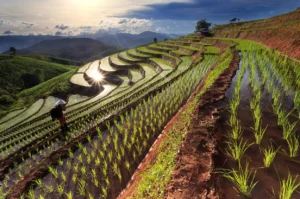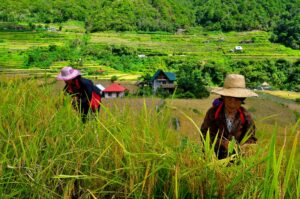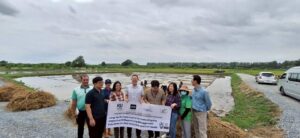With her tiny frame, blunt-cut bangs, and trendy outfits, 28-year-old Truong Thi Thanh Nhan looks more like a school girl than a farmer. Nhan earned her degree in software programming from the University of Science in Ho Chi Minh City, Vietnam, in 2010. But, after graduation, she agreed to her parents’ wishes to oversee their family farm in Dak Lak Province in Vietnam’s Central Highlands.
In December 2011, Nhan started the daunting task of managing their almost 70 hectares of land. She started planting rice twice a year on 20 hectares of their farm. Once a year, Nhan also grows maize and pumpkin on 10 hectares each. Although her family’s farm is located on a steep slope, bringing water into the field was easy because the field was next to a water canal. It was managing the water—making sure that higher areas were reached—that was the problem. Most of the rice plants in higher areas die because they lacked sufficient water. She had no choice but to hire many laborers to replant the field.
A flair for laser
In early 2012, Nhan chanced upon a show on a Vietnamese TV channel that featured rice farmer Nguyen Loi Duc from Tri Ton District, An Giang Province. She found herself glued to the channel as Nguyen was sharing his experiences and the benefits from laser leveling his 150-hectare field. With her interest piqued, she searched the Internet to learn more about the technology.
With laser leveling, a transmitter placed at the side of the field sends a laser beam to a receiver, which is attached to a leveling bucket drawn by a tractor. Then, a control panel mounted on a tractor interprets the signal from the receiver and opens or closes a hydraulic valve, which in turn raises or lowers the bucket. The bucket then drags and drops soil across the field to make it even.
Nhan, together with her family, visited Nong Lam University (NLU) in Ho Chi Minh City. They were briefed on the technology by NLU staff member Tran Van Khanh, a principal lecturer on agricultural machinery, and Phung Anh Vinh Truong, a researcher who became Nhan’s husband in 2013 and now helps her manage the farm.
Engr. Khanh emphasized the benefits of the technology and assured Nhan’s family that the International Rice Research Institute (IRRI) also provides technical support. Nhan’s family was convinced and decided to buy laser-leveling equipment and a drag bucket from a Saigon-based distributor, Ideal Farming Corporation.
Loads of benefits
They began using laser leveling in their rice-growing area. “Now that 9 hectares of our rice field have been laser-leveled, the benefits have been tremendous,” Nanh says. “We save on water because we don’t need to pump more water to reach the once-high areas. With even water coverage, the crops are healthy and thriving—and we don’t need to hire laborers for replanting.”
Laser leveling their land had other benefits too. Fertilizer is now spread evenly among the crop, saving as much as 77 kilograms per hectare. Pests, which used to hide in uneven spots, can no longer do so, resulting in less pesticide applied. Weed control is also easier. Herbicide spraying has been reduced to one, before the emergence of rice, unlike before when they sprayed herbicide twice during the season. The yield from the laser-leveled field during the dry season, from January to May 2013, was higher at 6.7 tons per hectare compared with 4.5 tons per hectare for the unleveled field.
The laser-leveling equipment, however, is subject to wear and tear. Nhan’s husband, Truong, shares that the usual challenges they face with laser leveling have more to do with fixing the equipment when it breaks down. It usually takes a week to repair the system, and Truong, being an agricultural engineer by profession, does it on his own in their workshop. However, since they live in a rural area where power shortages are common, repairing broken equipment takes more time and effort.
Spreading the word
But, overall, Nahn’s decision to purchase the equipment is proving to be a very wise one. As the neighboring farmers witnessed the improvements on Nhan’s rice farm, it wasn’t long before they sought her help. She already provided laser-leveling services to one farmer’s 2.7-hectare rice field in December 2012 and she has plans to do more.
“After I finish leveling our 20 hectares of rice farm and our maize farm, we plan to rent out our equipment to other farmers, not only for rice but for other crops as well,” says Nhan.
Nhan is now also on a mission. An advocate of laser-leveling technology, she shares her experiences in adopting laser leveling with representatives from both the public and private sector during meetings and seminars on postharvest technologies organized by the Asian Development Bank-IRRI Postharvest Project.
A role model
Although Nhan is not a typical Vietnamese farmer, she has managed to turn their farm into a productive and efficient business. But, many people are surprised by Nanh’s decision to be a farmer. They do not understand why a young lady like her, with a background in software programming from a prestigious university, would want to go back to agriculture.
For Nhan, it was no surprise. Her parents both grew up on farms, and agriculture was part of their family tradition. Going back to her roots made her happy and she is optimistic about her future. She hopes that, with a new generation of farmers like her, it will be possible to change the general perception of farming.
“Nowadays, young people think that farmers are old-fashioned, poor, and lack social standing, and that returning to the farm is a last option,” says Nhan. “I am a smart, young, dynamic person, and even though I am a farmer living in an area without many comforts and I face difficulties with finances and managing people, I know that I am on the right path toward a stable income and a sustainable future.
“I am contributing to food sustainability for my region and country, which young people now rarely do. And, I have my family to thank for helping me be the farmer that I am now.”
___________________________________________
Ms. Trina Leah Mendoza is a senior communication specialist at IRRI.









Hi
What a fantastic story. I had my own buisness in laser levelling in Australia from 1984 till 2008. Since have studied with Ba Env sc Resource Management. I have a lot of skills for equipment design and innovation being a farmers son. With over 25000 hours laser levelling experience, perhaps i can help solve and pre empt some of your future challenges.
Thanks Ashley Walker